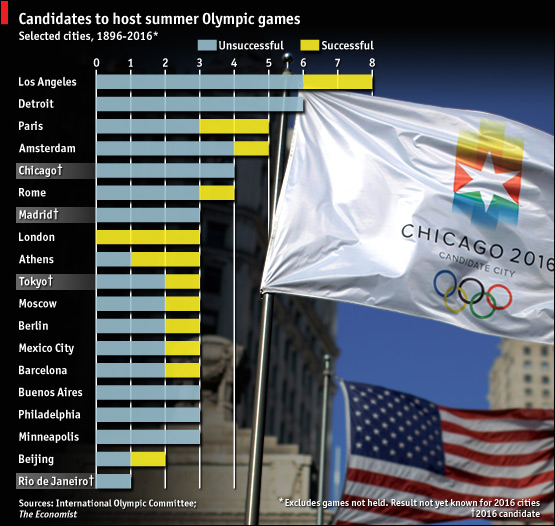Re Ian Bremmer 'Could third-party candidates upend the 2024 US election?' 3 April The current political movement in the USA…
2016 Olympics Rio de Janeiro
Written by Diana Thebaud Nicholson // August 22, 2016 // Olympics // Comments Off on 2016 Olympics Rio de Janeiro
Follow Rio 2016 Olympics
NYT slideshow of Opening Ceremony
CBC (short) video of Opening Ceremony
2016 Rio Summer Olympics Closing Ceremony Fireworks Live
The Olympics allow democracies to behave like dictatorships—if only for a short time
(Quartz) There’s a long history of host cities, most of which operate in democracies, temporarily enforcing far-reaching measures to ensure the Olympic Games go ahead without a glitch. Host cities do everything they can to achieve the most coveted goal—the claim to have hosted “the best Olympic Games ever.” But this label comes at a heavy price.
So much so that Helen Jefferson Lenskyj, professor emerita of sociology at the University of Toronto, remarks—rather tongue in cheek—that “the best places to hold the Olympics are in totalitarian regimes. They can make sure everything goes absolutely smoothly.” (1 August 2016)
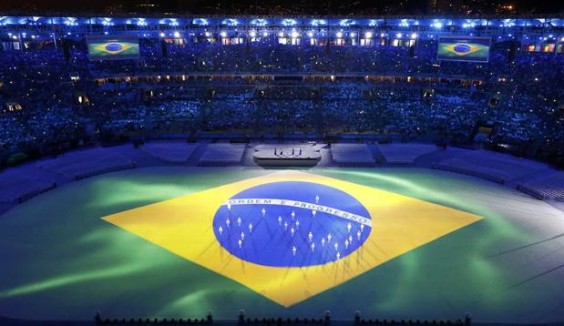
2016 Rio Olympics – Closing ceremony – Maracana – Rio de Janeiro, Brazil – 21/08/2016. The Brazilian flag is seen projected during the closing ceremony. REUTERS/Fabrizio Bensch FOR EDITORIAL USE ONLY. NOT FOR SALE FOR MARKETING OR ADVERTISING CAMPAIGNS.
Rio Olympics 2016: Spectacular closing ceremony as Olympic flag goes to Tokyo
(BBC) The Rio Olympics ended with a spectacular carnival-inspired closing ceremony, and the official handover to 2020 hosts Tokyo.
The colourful ceremony, lasting almost three hours, celebrated Brazil’s arts and was held in a wet Maracana.
Among the highlights were Tokyo’s impressive showcase and a vibrant carnival parade.
One of the biggest cheers of the night came when Japan’s Prime Minister Shinzo Abe appeared dressed as computer game character Super Mario, rising out of a huge green pipe in the stadium
(Mario steals the show for Nintendo at Rio Olympics closing ceremony)
What happened?
The Maracana was turned into a street carnival as the ceremony celebrated Brazil’s art, music and dance.
Highlights included human formations of iconic Rio landmarks Christ the Redeemer and Sugarloaf Mountain.
The Olympic flame was extinguished by a rain shower, which then gave life to a large tree sculpture to symbolise rebirth.
The Rio carnival anthem ‘Cidade Maravilhosa’ played as the party reached a crescendo.
Brazilian model Izabel Goulart led a parade of 50 women and 200 dancers, who were joined by a sound truck containing 12 carnival queens.
The ceremony concluded with a confetti and firework show
After Olympics, Rio Is Altered if Not Reborn
(NYT) There have been cost overruns and complaints about spending billions on a mega-event when teachers have gone unpaid. Critics say upscale areas have been favored at the expense of slum dwellers. A pledge to clean up Rio de Janeiro’s polluted bay went unfulfilled, while the promise of law and order now feels like a cruel taunt in the face of rising crime.
But the criticism aside, the 2016 Summer Olympics in Rio have profoundly altered this city of six million, yielding a revitalized port; a new subway line; and a flush of municipal projects, big and small, that had long been on the wish list of city planners.
“If we set aside our political passions, it’s plain to see that the Olympics have created an enormous legacy for Rio,” said Pedro Corrêa do Lago, a historian, economist and former president of Brazil’s national library. “These are improvements that might have otherwise taken 20 or 30 years to realize.”
18 August
We cannot let the Paralympics take a step backwards at Rio
Anne Wafula Strike
(The Guardian) Athletes from 50 poorer nations face missing the Games because money intended for them has been spent elsewhere. …
Some of these athletes really struggle. Lacking proper equipment, they can’t compete on an even playing field but they still feel proud to wear the colours of their countries. When their stories of success make the headlines, it causes people who might have stigmatised or ostracised them to appreciate them as positive contributors to society. I can’t imagine the shock that has hit the affected athletes. They have worked for four years, made the teams, and sacrificed so much – only to be told they are likely to miss going to Rio after all, because money intended for the Paralympics has been spent elsewhere. We have come a long way and we must not allow ourselves to step backwards – instead we should be making a giant leap forwards.
Ugly Americans
‘Not acceptable’: Ryan Lochte accused of lying about robbery after gas station vandalization
(CBC) Swimmers’ behaviour does not ‘represent the values of Team USA,’ USOC say
Brazil detained US swimmers. Authorities stopped Gunnar Bentz and Jack Conger from boarding a flight at Rio airport, taking them for further questioning after their accounts of being robbed at gunpoint in the city on Sunday didn’t match CCTV evidence. Teammate James Feigen is also staying in Brazil, but Ryan Lochte had already left the country.
17 August
Empty seats, unpaid travel and low ticket sales: fears for Rio’s Paralympics
• IPC president says situation is ‘precarious’
• Organisers insist Games ‘will be a success’
(The Guardian) The Rio Paralympics next month look set to play out in near empty venues after the organisers revealed that only 12% of the tickets have been sold.
The International Paralympic Committee had been hoping to build on the huge success of London 2012 but there are now major fears the Rio Games could set the movement back.
It has been widely reported in the local media that the organising committee has diverted much of the Paralympic budget towards the Olympics, as problems with basic infrastructure, security and transport have mounted. Paes has promised an additional £36m for the Paralympics, which start on 7 September, but a court injunction has held that up until Rio 2016 opens its accounts for public scrutiny.
15 August
 Pole vaulter Thiago Braz delights Olympic Stadium by winning second gold for host nation
Pole vaulter Thiago Braz delights Olympic Stadium by winning second gold for host nation
Brazil’s Thiago Braz da Silva caused a huge upset on Monday night (15 August), beating defending champion and world no,1 Renaud Lavillenie of France to win the pole vault final.
Braz forgot three early failures, passed on 5.98m and pushed the Frenchman to 6.03m, which he failed to clear twice. The Brazilian’s final jump saw him clear that mark to establish a new Olympic record, surpassing the mark set by Lavillenie in London four years ago.
14 August
Quartz: The Rio Olympics giveth—and taketh. — Jamaica’s finest, Usain Bolt, became the first athlete to win three Olympic 100m gold medals, and Michael Phelps captured his 23rd gold medal and a silver for a career total of 28. In more somber news, US swimmers including Ryan Lochte were held at gunpoint and robbed by muggers pretending to be armed police in Rio
Singapore’s First Olympic Gold Medalist Returns to Hero’s Welcome
(WSJ) The tiny city-state marked the return of swimmer Joseph Schooling with a surge of national pride and selfie-taking
The swim star’s win on Friday, with a time of 50.39 seconds, was all the more significant given that he beat U.S. swimmer Michael Phelps, the most decorated Olympian in history.
Mr. Phelps, whose lifetime tally of 23 gold medals almost equals the number ever won by 2016 Olympics host Brazil, is a childhood icon of Mr. Schooling’s.
12 August
Fiji Wins Its First Olympic Gold And Immediately Declares Public Holiday
“They’re all celebrating, they’ve been celebrating for the last three days,” said Fiji Prime Minister Frank Bainimarama of the scenes back home.
11 August
Dressage rider pulled out of Olympics to protect “My buddy, my friend, the horse that has given everything”
A heartbroken Adelinde Cornelissen stopped mid-routine, deciding not to risk her beloved horse Parzival even though he appeared to have recovered from the illness he had caught from an insect bite
On Tuesday, Dutch Olympic dressage rider Adelinde Cornelissen entered the arena on her horse Parzival, guided him through a few movements, then stopped, raised her hand in salute and rode off the field and out of the competition.
The heartbreaking decision was the culmination of a huge amount of soul-searching but in the end Cornelissen decided to put the welfare of her horse ahead of her own Olympic ambitions and those of her teammates.
9 August
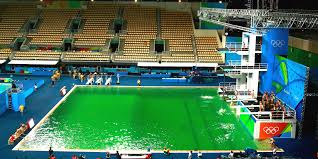 Green water in Rio diving pool raises eyebrows
Green water in Rio diving pool raises eyebrows
Organizers say no risk to athletes
Update 14 August We Finally Know Why The Olympic Diving Pool Turned Green — According to the New York Times, somebody accidentally added 160 liters of hydrogen peroxide on Aug. 5 to the pool used for diving, which neutralized the chlorine and caused it to turn green.
5 August
Rio’s Olympic opening ceremony was as diverse and divided as Brazil is right now
In Rio tonight (Aug. 5), the narrative that unfolded before the parade of nations was centered on the various racial and national groups that have come together to form the Brazil that exists today. It’s made up of indigenous, European, African, Middle Eastern, and Asian peoples, and filled of course with music, dancing, and the supermodel Gisele Bundchen. But the story also suggested that Brazil faces a growing and alarming threat.The explicit threat is climate change, which the ceremony presented as a crisis endangering the entire world.
Three ways to reimagine the Olympic Games
As the Games kick off in Rio de Janeiro, Brazil, on August 5, the focus will be on athlete performances. But can we imagine a more just Olympics? We asked three experts.
(Open Canada) The Games arrive on the heel of concerns over Brazil’s Zika virus outbreak, a national corruption scandal, revelations of Russian doping, and debate over the impact of the Games on human rights and the economy. Hosting the event costs billions of dollars; Rio’s price tag is an estimated US$4.1 billion (considered modest compared to past years).Could there be a less controversial and more just way to host a global sporting event of this calibre? We asked three experts whether it was time for an Olympic-sized revolution. Here are their suggestions for reform:
1. Reform funding mechanism, host criteria and human rights requirements.
— Bruce Kidd, vice-president, University of Toronto Scarborough, and former professional athlete
2. Get rid of the IOC. It’s time for a new international body to govern these events.
— Luiz Martins de Melo, Economics Institute of the Federal University of Rio de Janeiro
3. Cancel the Olympics and dream up something completely new.
— Ann Peel, former racewalker for Team Canada and founding co-chair of Athletes CAN.
2 August
The cursed Olympics? Freak 15-foot waves flood TV broadcasting building on Rio’s Copacabana Beach sparking fears it could collapse into the sea
(Daily Mail) the worst hit building was the temporary structure created for the Olympic Broadcast Services, which is due to be used by foreign journalists covering the the Games.
The building became completely flooded and suffered major structural damage, sparking fears it could collapse.
It comes after leading scientists in Rio described the location of the studios as ‘one of the worst places along the shore.’
Rio 2016 Olympics: Pollution threat muddies waters as Games draw near
(CNN) Plans to revamp Rio’s infrastructure, including massively upgrading its sewage and water-cleaning capabilities, have been dented by the economic downtown that has affected Brazil since the Games were awarded.
Olympic organizers said emergency measures were in place if the water quality were to become dangerous at any time during the Games.
Contingency plans could include changing the times of sailing events — pollution is worst in the mornings — or the location of the launch area.
1 August
4 days before the Olympic Games start, Rio seems far from ready
(PBS Newshour)The governor recently declared a state of public calamity. City waterways are fouled and filled with bacteria, streets are clogged with traffic, and transportation projects aren’t finished. And beyond the Olympics, political chaos, as President Dilma Rousseff awaits an impeachment trial.
Days before the start of the Olympic Games, we look at the state of play in Brazil with NPR’s Rio de Janeiro-based Lulu Garcia-Navarro, Alex Cuadros, author of the book “Brazillionaires,” a look at wealth and inequality in Brazil in the decade leading up to the Olympics, and Paulo Sotero, director of the Brazil Institute at the Woodrow Wilson International Center for Scholars in Washington, D.C.
CBC’s Adrienne Arsenault tried to give an up-beat report Is Rio ready for the Olympics?, but quailed before construction headaches, displacement of population and concerns about infrastructure, meanwhile The Atlantic posted a searing critique of the corruption that has surrounded the construction of the venues
The Broken Promise of the Rio Olympics – How a chance to remake the city for ordinary Brazilians ended up lining the pockets of the rich instead.
29 July
The trouble with the Olympic Games
In light of the Russian doping scandal, London’s debatable legacy and the craven prostrations of prospective future hosts, the Olympic ideal looks shabby indeed as we draw closer to Rio. What is the point of the Games today?
(The Guardian) The [London] Aquatics Centre does seem well used, though nearly all the water is divided into Olympic-type lanes for the dutiful swimming favoured by office workers, rather than the wet larks of childhood. A few people were in the Orbit. And the centrepiece of Sebastian Coe’s much-vaunted legacy, the stadium itself, was about to stage last weekend’s Anniversary Games, an event so important that at dawn on Monday it was not in the top 18 stories on the BBC Sport home page. Next month the stadium will go into regular use – unlike those in Athens and Beijing – as the de facto property of London’s fourth-best football team: an almost free gift from the British people to that most deserving of causes, a Premier League club.
The London Olympics met no genuine national policy need, not one. But they were conceived under one prime minister who preferred the show to the substance, Tony Blair, and executed under another, David Cameron.
In 2012 Britain did not need to rehabilitate itself from utter national disgrace (Tokyo 1964, Munich 1972), nor impress its progress on an unknowing world (Seoul 1988), nor spend billions on a tourist advertising campaign (Barcelona 1992). There would have been a purpose had the Birmingham and Manchester bids of the late 20th century succeeded: rebalancing the economy away from the south-east. But they were always doomed.
No lasting benefit from London’s agreeable binge has ever been authenticated: east London would have been bourgeoisified anyway, if that’s a benefit. The alleged effect on making youth leap off their sofas and on to sports fields was a chimera: a study quoted in the vital text on the whole Games-hosting industry, Circus Maximus by Andrew Zimbalist, showed that no Olympics has ever achieved that.
… Zimbalist cites 19 different reports from 2002 onwards showing that Olympic and World Cup hosts derived minimal or negative benefits in employment, tourism and general growth. The empty hotel room has become as much a symbol of the Olympics as the five rings. Mostly, as in London, this reality is tucked away under layers of propaganda, although the locus classicus remains Montreal 1976. “The Olympics can no more have a deficit than a man can have a baby,” swanked Mayor Jean Drapeau. That baby was 30 years old before the city paid off the debt.
Awareness of the Olympics’ dark side is growing. Brazil has been in ferment. Tokyo, the 2020 host, is restless. Boston and Hamburg had to stop bidding for 2024 because of protests. By the 2030s it will probably only be only egomaniac leaders, mostly unelected, who will even dare to get involved.
It is this ceaseless search to find the next host that is most of all wrecking the Olympics, inducing cities to fritter billions on facilities that have no useful afterlife and destroy the lives of the poor who get in the way. The same process has produced such monstrosities as the 2014 Sochi Winter Olympics and, lying in wait for us all, the 2022 Qatar World Cup.
For the summer Games at least, there is a potential solution: returning the Olympics to its ancient home. Greece is ideally placed geographically. Athens produced a serviceable Games in 2004, after much panic, cockup and, doubtless, corruption beforehand. It is now thought to have a world-record number of venues rotting away to no purpose. Take away the need to start from scratch every four years and the event – even allowing for Greece being Greece – could acquire the orderliness and patina of tradition and calm programme of improvements that attend the golf at Augusta and the tennis at Wimbledon.
Doping and an Olympic Crisis of Idealism
(The New Yorker) The International Olympic Committee announced that all Russian athletes would have to appeal to the international federation of their sport in order to gain eligibility to compete at next month’s Rio Olympic Games. For anti-doping officials and for many athletes, the announcement was disappointing; they had been seeking a ban on all Russian athletes. Last week, the World Anti-Doping Agency released an independent report, which ran nearly a hundred pages, offering proof of a Russian state-sponsored doping system that gave athletes performance-enhancing drugs and then covered up their test results. The methods are the stuff of a spy thriller—a secret laboratory for replacing samples in the laboratory at the Sochi Olympics, actual cocktails of steroids dissolved in alcohol (“Chivas for the men and vermouth for the women”)—but the extent of the scheme is even more incredible. According to the report, Russian athletes cheated in more than thirty sports. The I.O.C. determined that “Russian athletes in any of the 28 Olympic summer sports have to assume the consequences of what amounts to a collective responsibility.” What is at stake, the I.O.C. said, is nothing less than the “credibility of the Olympic competitions.”
The vast majority of athletes, of course, are “clean.” (Even the word is telling.) But, ultimately, doping has become so sophisticated and hard to police, and the rewards so significant, that it is impossible to eradicate. A recent retesting of samples from the London and Beijing Games uncovered forty-five positive tests—twenty-three of which came from medalists. And testing may not be the most effective way to uncover the use of performance-enhancing drugs. Most of the major anti-doping success stories—the cases of Lance Armstrong; BALCO; and, now, the Russian Olympic team—relied on whistle-blowers and methods more commonly associated with criminal investigations. Doping is a problem in the N.F.L., N.B.A., M.L.B., N.C.A.A., in tennis, in horse racing, in Nascar—everywhere the rewards far exceed the punishment. But it is a particular challenge for the Olympics, because the Olympics are supposed to mean something more than an athletic competition.
The distance between the ideal and the reality has never seemed greater. The bribery scandal during the bidding for the 2002 Salt Lake City Winter Games exposed an organization rotted by corruption. The price of hosting an Olympics has become so astronomical that few cities, especially in democratic countries, are willing to do it. In the cities that do, the residents who are least prepared to bear the costs often end up bearing the most. The runaway spending during the 2004 Athens Games—much of which was public debt—became a symbol of what was wrong with Greece’s economy when it went bust a few years later. In Beijing, the magnificent “Bird’s Nest” stadium sits underused and rusting. The risk of terrorism has led to draconian surveillance and security measures. Right after the Sochi Olympics, the host nation forcefully annexed Crimea.
And now Rio seems to be a catastrophe even before it begins. The water is polluted, the country is in a deep recession, the government is in the midst of political scandal, and the city is facing rising crime rates. Then came the Russian doping scandal.
In the end, the real question may not be whether the I.O.C. made the right decision on the Russian athletes. It is, instead, about what ideals the Olympics really represent.
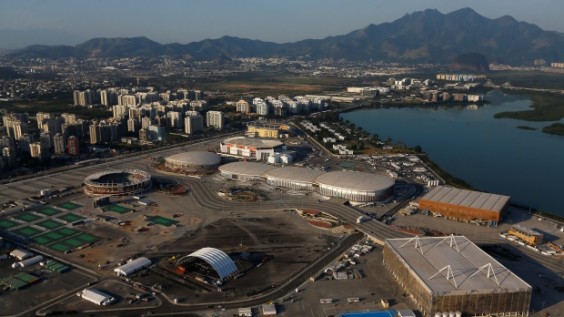
24 July
Decision of the IOC Executive Board concerning the participation of Russian athletes in the Olympic Games Rio 2016
(Olympic News) On the basis of the Findings of the IP Report, all Russian athletes seeking entry to the Olympic Games Rio 2016 are considered to be affected by a system subverting and manipulating the anti-doping system. The IP Report indicates that, due to “the highly compressed timeline”, the IP has “only skimmed the surface of the extensive data available”. The IOC EB therefore came to the conclusion that this view cannot be restricted only to athletes from the 20 Olympic summer sports mentioned in the IP Report.
Under these exceptional circumstances, Russian athletes in any of the 28 Olympic summer sports have to assume the consequences of what amounts to a collective responsibility in order to protect the credibility of the Olympic competitions, and the “presumption of innocence” cannot be applied to them.
21 July
Brazilian police arrest Isis-linked group over alleged Olympics attack plot
A dozen Brazilian citizens accused of pledging allegiance to Isis and allegedly part of group called defenders of sharia were ‘absolutely amateur’, officials say
16 July
Canadian anti-doping leaders drafted a letter officially calling for Russia to be banned from Rio Olympics
(National Post) A letter drafted by U.S. and Canadian anti-doping leaders urging Russia’s removal from the upcoming Olympics is circulating days before the public release of a report expected to detail a state-sponsored doping system that corrupted the country’s entire sports program.
The letter, drafted last week and obtained by The Associated Press, is being prepared to possibly be sent to the International Olympic Committee’s president and executive board after the Monday release of a report by investigator Richard McLaren
Milos Raonic withdraws from Rio Olympics citing ‘variety of health concerns ” I am making this decision for a variety of health concerns including the uncertainty around the Zika virus.”
5 July
Is Rio Ready? Gold Medallists Weigh In
(CBC) Brazil is awash in controversy, one month before the start of the Rio Olympics. Gold medallists Hayley Wickenheiser and Mark Tewksbury weigh in on the stress this puts on athletes.
But had they read this report?
‘Super bacteria’ discovered in Rio’s waters as Olympics near
(CNN)A group of Brazilian scientists has detected a drug-resistant bacteria growing off some of Rio de Janeiro’s most stunning beaches, in research being published a month before the city hosts the 2016 Olympic Games. According to lead researcher Renata Picao, the “super bacteria” entered the city’s waterways when sewage coming from local hospitals got channeled into the bay.
3 June
IOC names Olympic refugee team for Rio 2016
Team comprised of 10 athletes, will compete in 3 sports
Ten refugee athletes from Africa and the Middle East were selected Friday to compete under the Olympic flag at the Rio de Janeiro Games in what the IOC said represents a “symbol of hope” for migrants and refugees around the world.
The members of the first ever Olympic refugee team include athletes from South Sudan, Syria, Congo and Ethiopia who will compete in track and field, swimming and judo.
The team of six men and four women will march together behind the Olympic flag in the opening ceremony in Rio’s Maracana stadium on Aug. 5.
Re-examine Zika risk of Rio Olympics, WHO asks experts
Director-General responds to U.S. senator’s request to evaluate Games staging
In a request last month, U.S. Senator Jeanne Shaheen asked WHO’s Director-General Dr. Margaret Chan to evaluate whether the Rio games should be delayed or postponed.
Chan said in a letter released by Shaheen Friday that WHO has sent senior scientists to Brazil four times to assess the risk of Zika to the approximately 500,000 athletes and visitors expected to attend the Aug. 5-21 Olympics.
28 May
WHO rejects call by scientists to postpone Rio Olympics due to Zika virus outbreak
In an open letter to the WHO director-general released Friday, experts from over two dozen countries in fields including public health, bioethics and pediatrics — among them former White House science adviser Dr. Philip Rubin — called for the Rio games to be delayed or relocated, though not cancelled, “in the name of public health.”
Hundreds of thousands of people from around the world are expected to travel to Rio de Janeiro and other Brazilian destinations this summer to see some 10,000 athletes compete at the games.
- WHO chief says ‘I’m going’ to Rio Olympics despite increasing worry over Zika virus
- Zika concerns prompt call to ‘postpone or move’ Rio Olympic Games
- Consider moving Rio Olympics, health experts urge WHO
18 February
The Promise Rio Couldn’t Keep
Rio de Janeiro’s bid for the Summer Games featured an official commitment to cleaner waters. But with less than six months to go, trash and contamination continue to lurk.
(espn) In August, barriers installed across more than a dozen of Rio’s dying rivers will hold back garbage that otherwise might drift into the paths of Olympic sailors. A fleet of boats will patrol to keep debris from snagging on a rudder or centerboard and costing someone a medal. Some of the untreated human waste that has long fouled Rio’s beaches and docks and picturesque lagoon will be diverted from competitive venues so the athletes who have to navigate them need not worry.
This is what has been promised, anyway. This is the latest stopgap wave of promises made when it was clear the first wave wouldn’t be kept.
3 February
Can Brazil’s Olympics survive the Zika emergency?
Nearly overnight, the Zika virus has caught the world’s attention. Will Brazil be able to ease concerns before August?
(Open Canada) Three recent developments are changing the Zika crisis: global media awareness, new possible vectors, and doubts — at the epicentre of the crisis — about Brazil’s capacity and honesty. Together, they threaten the upcoming Rio Olympics.
Today, Zika is front-page news every day the world over. This is mostly good as it keeps prodding governments and the increasingly nimble global infectious disease community. As usual, the danger is that, were the epidemic to be less serious than currently speculated, the overblown coverage could lead to public cynicism and, subsequently, less urgency from politicians, less money for research, and public nonchalance when a truly severe one hits: call this the “swine flu” scenario. Fortunately, public health organizations and experts have become very adept at balancing warnings with caveats. In the face of global infectious diseases, panic is not the default mode any more.
The second development is only bad, as researchers — still tentatively — point to new vectors for the disease.
2015
1 December
The mosquito-transmitted virus that is causing alarm in Brazil
The Zika virus has prompted a state of emergency and a recommendation that Brazilian women postpone pregnancy. It may also blow the doors open on crucial debates — from abortion to climate change.
(Open Canada) A little-known virus called Zika has led to the declaration on Sunday of a state of emergency in Pernambuco, Brazil’s sixth most populous state. An unusually large number of suspected cases of microcephalia, a neurodevelopmental disorder, has been detected among newborns here over the last few months. The babies affected have an abnormally small cranium, a condition that is often associated with intellectual and developmental handicaps. This past weekend, Brazil’s health ministry has formally established a link between the presence of the virus and that condition, which however may also have a variety of other causes, from syphilis to malnutrition.
7 August
Rio 2016: One year out Brazil not delayed or over budget, says mayor
• Eduardo Paes: ‘We are trying to create legacy where things are done on time’
• Countdown to Games marked by presidential gala and test rowing event
Following criticisms of water quality, police violence, forced relocations and excessive benefits to private developers, the mayor countered with a positive vision of how Rio was transforming as a result of the Games.
Would you swim in Rio’s polluted waters?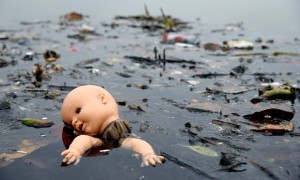
Brazilian officials confirm water cleanup won’t be finished in time for 2016 Olympics
5 August
Olympic chiefs to order testing for viruses in Rio’s sewage-polluted waters
The International Olympic Committee said Sunday it will order testing for disease-causing viruses in the sewage-polluted waters where athletes will compete in next year’s Rio de Janeiro Games. Before, the IOC and local Olympic organisers in Rio said they would only test for bacteria in the water, as Brazil and virtually all nations only mandate such testing to determine the safety of recreational waters. But after an Associated Press investigation published last week revealed high counts of viruses directly linked to human sewage in the Olympic waters, the IOC reversed course after being advised by the World Health Organisation (WHO) that it should expand its testing.
30 July
Athletes at Rio Olympics to compete in ‘basically raw sewage’, study reveals
Analysis of Rio waters reveals dangerous contamination levels
Marine biologist: ‘What you have there is basically raw sewage’
None of three Olympic water venues tested were deemed safe
2013
Brazil’s Long To-Do List
Can Brazil build the massive infrastructure it needs to host the Olympics and the World Cup?
(Americas Quarterly) Never mind that the Brazilian government is trampling the homes and uprooting the communities of the poor in some inconveniently located favelas. Never mind that many of the million-plus residents of Rio de Janeiro’s shantytowns still find their lives controlled by violent drug gangs and that the crime rate in Rio ranks among the highest in the world. Never mind that 1.5 million Brazilians are scheduled to be relocated before 2014.
There’s a party to throw —actually two— and the world will be watching. Brazil will host soccer’s World Cup in 2014 and the Summer Olympic Games in 2016. Years ago, when Brazil convinced the International Federation of Association Football (FIFA) and the International Olympic Committee (IOC) that it had the best plan to host these mega-events, grand promises of new sporting venues and modern infrastructure were made.
If Brazil’s dreams for these games became reality, here’s what would have to happen: Brazil’s post-1994 economic boom would have to accelerate, and the country would grow from an emerging market into a developed economy. That would enable Brazil to afford the estimated $1 trillion in public works spending to pay for renovation and construction of 12 stadiums and a massive overhaul of the national transportation infrastructure. The projected work includes: building new roads; creating a rapid-transit train between São Paulo and Rio, new subway lines in São Paulo (especially Line 4 from the airport to downtown), and new ports; and expanding 12 airports — not to mention building new hydroelectric plants and transmission lines to power it all. The investment and construction would generate hundreds of thousands of new jobs and investment opportunities would multiply. (June 2013)
29 June
Why Brazilians are right to demand ‘bread not circuses’: Burman
The costly Montreal Games explain why millions in Brazil are protesting as the country prepares for soccer’s World Cup and the Summer Olympics.
Lula’s policies as president improved the conditions of the extremely poor — and the extremely rich — but did little to help the middle class in an enduring way. And they heightened expectations throughout Brazil. The protests in recent weeks have affected dozens of cities and the grievances have ranged from growing rage over poor public services to government tolerance of corruption and the high cost of World Cup soccer facilities.
As with the public protests in Turkey, which started with resentment about a mall being built in a city park, the trigger in Brazil was similarly specific: the high cost of bus fares in one city. But then it expanded to reveal a widespread public belief that Brazil’s political process is dysfunctional, if not completely corrupt.
28 June
Brazil protests show cost of hosting major sports events
Protests continuing amid Confederations Cup tournament in Rio
2009
Gang violence hits new heights in Rio, site of 2016 Games
Drug traffickers in Rio de Janeiro shot down a police helicopter just two weeks after the city was named the site of the 2016 Olympic Games — the first in South America. Brazilian officials fear the perception and reality of drug violence, in particular in Rio, could hamper the efforts of investors looking to raise money for Olympic infrastructure. The gang and drug-war violence of Brazil will be the subject of a new film by Jon Blair, for which he accompanied 850 special-unit police on a mission to recover bodies of traffickers ritually burned after a gun fight between gang and police forces. The New York Times (10/20) , The Independent (London) (10/21)
3 October
While there is no doubt that the fact that Chicago failed in its Olympic bid, despite the presence of both Obamas, will be greeted by prophets of doom as a rejection of the Obamas, we agree with the sentiments expressed in Victory: Chicago loses the Olympics
Barack Obama may not be feeling it, but he is the luckiest man alive right now. Yes, President Obama traveled all the way to Copenhagen and didn’t even get a lousy t-shirt, but he is damn fortunate it went down like it did. Obama is the first U.S. President to ever appear before the International Olympic Committee and plea for the games. If they had come to the Windy City, it would have been an eight-year distraction and political gold for his opponents. Every time an Olympic project came in late and over budget, every time a scandal hit the tabloids, every time a crime was captured on a cell phone camera it would have been “Obama’s Olympic Folly.” Imagine Rush Limbaugh or Glen Beck oozing over to Chicago with every blip in the process. It would have all been at best a distraction and at worst, an endless spigot of champagne for his enemies. The person who really has egg on his face is Mayor Richard Daley. He wanted to show everyone he was a bigger man — and mayor — than his Daddy with an Olympic sized stadium to boot. Now expect all the Daley arm-twisting and all the dirty skulduggery in the lead up to both come to light and come home to roost.
The Economist echoes some of these sentiments:
But is staging the Olympics such a great coup? The pluses may seem obvious. Big building projects will employ lots of people who will spend their wages in the rest of the economy. Railways and roads will be built that might otherwise have stayed on the drawing board for years. Visitors will come from far and wide, either for the games or as tourists afterwards. That all sounds especially alluring in a recession.
The pro-Olympics lobby tends to downplay the disadvantages. Building in the host city may push up wages and prices and crowd out investment elsewhere. Hurrying up building projects raises costs. What suits the games may not be best for the city afterwards. Not every visitor during the games is an extra one; tourists may time long-wished-for trips to watch the sport. Crowds or inflated hotel prices may deter others from coming. By and large, economists have found it hard to detect the benefits of big sporting events. Robert Baade, of Lake Forest College, near Chicago, describes the Olympics as a “high risk, low reward proposition”, but concedes that the games may prompt spending, say in transport, which boosts a region’s economy in the long term.
For Obama, an Unsuccessful Campaign
(NYT) A 20-hour mission across the ocean to persuade the International Olympic Committee to give the Summer Games of 2016 to Chicago ended with the president’s adopted hometown finishing fourth of four candidate cities.
Although Chicago might have lost to Rio de Janeiro for reasons that had little to do with Mr. Obama, the fact that he made himself the face of its bid invariably meant that its defeat would be taken as a stinging rejection of its favorite son.
Which Olympic candidate cities have failed most often?
(The Economist) KINGS, presidents and television stars are among the grandees gathering in Copenhagen on Friday October 2nd to influence the International Olympic Committee’s choice of host city for the 2016 summer Olympic games. Barack Obama is set to address the committee in favour of Chicago, perhaps nudging his adopted city ahead of Rio de Janeiro, Madrid and Tokyo. Chicago has had plenty of practice: this is its fourth try as a candidate. Tokyo and Madrid have each had one fewer bid, while Tokyo has hosted the games. Rio is only the second South American city to be a candidate, after Buenos Aires had three unsuccessful attempts. Only Detroit has a worse record at Olympic bids than the Windy City, enduring six failures in six attempts.
